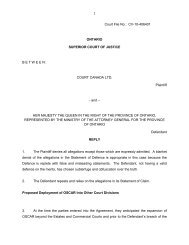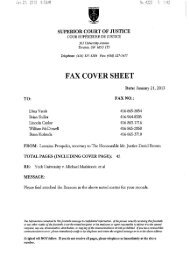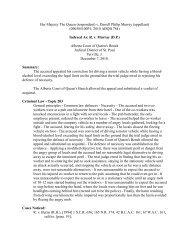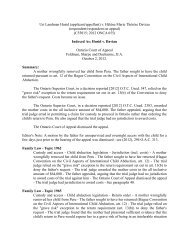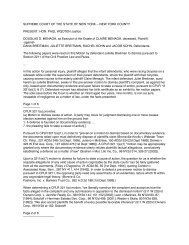R. v. Pitre (MS) - Slaw
R. v. Pitre (MS) - Slaw
R. v. Pitre (MS) - Slaw
- No tags were found...
Create successful ePaper yourself
Turn your PDF publications into a flip-book with our unique Google optimized e-Paper software.
Mark Stephen <strong>Pitre</strong> (appellant) v. Her Majesty the Queen (respondent)(51-11-CA; 2011 NBCA 106)Indexed As: R. v. <strong>Pitre</strong> (M.S.)New Brunswick Court of AppealDrapeau, C.J.N.B., Deschênes and Quigg, JJ.A.December 8, 2011.Summary:The accused appealed his conviction on each of two counts: one for production ofmarihuana (Controlled Drugs and Substances Act, ss. 7(1) and 7(2)(b)) and the other forpossession of marihuana for the purpose of trafficking (ss. 5(2) and 5(3)(a)).The New Brunswick Court of Appeal dismissed the appeal.Civil Rights - Topic 1604Property - Search warrants - Validity of - The accused appealed his conviction on each oftwo counts: one for production of marihuana and the other for possession of marihuanafor the purpose of trafficking - The evidence upon which both convictions depended wasseized during a search of the accused's residence - The accused challenged the facialvalidity of the warrant, asserting that ss. 11(1) and (4) of the Controlled Drugs andSubstances Act contemplated a warrant that identified by name the peace officer orofficers authorized to carry out the search - The trial judge rejected the assertion - TheNew Brunswick Court of Appeal dismissed the appeal - See paragraphs 12 to 14.Civil Rights - Topic 1604Property - Search warrants - Validity of - The accused appealed his conviction on each oftwo counts: one for production of marihuana and the other for possession of marihuanafor the purpose of trafficking - The evidence upon which both convictions depended wasseized during a search of the accused's residence - The accused challenged the facialvalidity of the warrant - The New Brunswick Court of Appeal dismissed the appeal,holding that "[s]ection 11 [of the Controlled Drugs and Substances Act (CDSA)] does notprescribe the use of a particular form for a search warrant. In my view, a duly signedsearch warrant purporting to issue pursuant to s. 11 of the CDSA will generally passfacial muster if it: (1) is directed at named or unnamed peace officers from the issuingjudge's jurisdiction; (2) identifies 'an offence with sufficient precision to apprise anyoneconcerned of the nature of the offence'; (3) describes the things 'to be seized with enoughspecificity to permit the officers executing the warrant to identify them and link them tothe offence'; and (4) pinpoints the place to be searched 'with sufficient accuracy to enablethe reader to know [for] what premises it authorizes the search' ... The warrant at issuehere satisfies those requirements and is facially unobjectionable." - See paragraph 15.Civil Rights - Topic 1604Property - Search warrants - Validity of - The accused appealed his conviction on each oftwo counts: one for production of marihuana and the other for possession of marihuana
for the purpose of trafficking - The evidence upon which both convictions depended wasseized during a search of the accused's residence - The accused challenged the sub-facialvalidity of the warrant, asserting that there was no evidence placed before the issuingjudge by which she could have compared the consumption of electricity during suspectedgrow activity and other periods, or contrasted the consumption of electricity at theaccused's with similar premises - Moreover, the accused submitted that the documentsevidencing electrical consumption did not identify kilowatt hours, but the cost to theconsumer - Finally, the accused said the Information to Obtain (ITO) was deficient infailing to provide any expert evidence to interpret the electrical consumption data at theaccused's during the pertinent period - According to the accused, without such evidence,the rate of electrical consumption at that location was entirely meaningless - The NewBrunswick Court of Appeal dismissed the appeal - There might be instances where themissing evidence might cast doubt over the existence of the requisite reasonable grounds- This was not the situation here, having regard to the totality of the information providedby the redacted ITO - See paragraphs 17 and 18.Civil Rights - Topic 1604Property - Search warrants - Validity of - The accused appealed his conviction on each oftwo counts: one for production of marihuana and the other for possession of marihuanafor the purpose of trafficking - The evidence upon which both convictions depended wasseized during a search of the accused's residence - The accused challenged the sub-facialvalidity of the warrant, asserting that the data in the Information to Obtain (ITO) was notsufficiently current to allow the issuing judge to find that there were reasonable groundsto believe that, during the period specified in the warrant, the "things to be searched for"would be at the accused's residence - The trial judge concluded that "While much of theinformation in the ITO is dated, it was important that the affiant set out the historicalcontext of the totality of the circumstances for the issuing judge. The ITO contains ampleinformation for the judge to have concluded that the accused's involvement with the drugtrade continued up until the date of the issuance of the warrant. ... Examining the totalityof the information in the ITO, there are sufficient reasonable grounds upon which theissuing judge could conclude that there was an ongoing involvement by the accused as aproducer of marihuana to the date of the warrant." - The New Brunswick Court of Appealdismissed the appeal - The trial judge did not err in his conclusion - See paragraph 19.Civil Rights - Topic 1604Property - Search warrants - Validity of - The accused appealed his conviction on each oftwo counts: one for production of marihuana and the other for possession of marihuanafor the purpose of trafficking - The evidence upon which both convictions depended wasseized during a search of the accused's residence - The accused challenged the sub-facialvalidity of the warrant, asserting that the applicant for the warrant knew the accused'sresidence was a two-unit residence and he misled the issuing judge by not underscoringthat fact - The accused asserted that the warrant was overly broad because it did nottarget a specific unit in the two-unit building - The trial judge rejected the assertion,stating that "I do not accept that the judge was misled as to the number of residential unitsin the building. ... During extensive surveillance nobody else was seen as associated withthe premises other than the accused, who was seen coming and going repeatedly. The
only phone line subscribed to the premises was in the name of the accused as well as theelectrical service. And the owner of the premises leased the entire premises to theaccused. In my opinion there was ample information from which the issuing judge couldreasonably conclude that the accused was the sole occupant of the premises as a singledwelling." - The New Brunswick Court of Appeal dismissed the appeal - The trial judgedid not err in his analysis or conclusion - See paragraph 20.Civil Rights - Topic 1604Property - Search warrants - Validity of - The accused appealed his conviction on each oftwo counts: one for production of marihuana and the other for possession of marihuanafor the purpose of trafficking - The evidence upon which both convictions depended wasseized during a search of the accused's residence - The accused challenged the sub-facialvalidity of the warrant, asserting that the trial judge failed to appreciate that theInformation to Obtain (ITO) provided hearsay information from unidentified sourceswithout accompanying evidence to sufficiently establish their reliability - The NewBrunswick Court of Appeal dismissed the appeal - The ITO provided more than sufficientevidence of source reliability and the standards developed in R. v. Garofoli (SCC 1990)and R. v Debot (SCC 1989) had been met - See paragraph 21.Civil Rights - Topic 1604Property - Search warrants - Validity of - The accused appealed his conviction on each oftwo counts: one for production of marihuana and the other for possession of marihuanafor the purpose of trafficking - The evidence upon which both convictions depended wasseized during a search of the accused's residence - The accused challenged the sub-facialvalidity of the warrant, asserting that the April 2009 Forward Looking Infrared (FLIR)examination of his residence was meaningless, having regard to the relatively neutralresults obtained from such an examination a mere two months previous (February 2009) -The trial judge rejected the assertion, stating that "I do not accept that its significance wasin any way diminished by the earlier inconclusive examination in February. As describedby the F.L.I.R. operator, in February, snow conditions were impeding his full access tothe profile of the premises such that he could not conclusively state that the exam wasconsistent with a grow operation. Conversely the April exam had clear access to theproperty." - The New Brunswick Court of Appeal dismissed the appeal - See paragraphs22 and 23.Civil Rights - Topic 1604Property - Search warrants - Validity of - The accused appealed his conviction on each oftwo counts: one for production of marihuana and the other for possession of marihuanafor the purpose of trafficking - The evidence upon which both convictions depended wasseized during a search of the accused's residence - The accused challenged the sub-facialvalidity of the warrant, asserting that the trial judge applied the wrong standard of reviewto determine the warrant's sub-facial validity - The accused asserted that the correctstandard required the trial judge to determine whether a warrant would have issued,having regard to the diminished evidentiary record that resulted from the Information toObtain's significant editing - The New Brunswick Court of Appeal dismissed the appeal -In R. v. Araujo (2000), the Supreme Court referred approvingly to the standard of review
accepted in R. v. Allain (S.) (NBCA 1998), namely that "the authority of a reviewingjudge on the question of the sufficiency of evidence is confined to ascertaining whetherthere was some evidence upon which the issuing judge, acting judicially, could issue thewarrant" - Reviewing courts were required to apply that standard, whether the supportingaffidavits had been edited or not - This was the standard applied by the trial judge in thecase at bar - Accordingly, there was no merit to the accused's submission to the contrary- That being said, the court added that "[m]y assessment of the difference between the'would' and 'could' tests has evolved since R. v. Allain (S.) and R. v. Shalala [NBCA2000). I no longer view the two tests as markedly different, at least for practicalpurposes" - See paragraphs 24 to 36.Criminal Law - Topic 3113Special powers - Setting aside search warrants - General - Scope of review - [See eighthCivil Rights - Topic 1604].Narcotic Control - Topic 2027Search and seizure - Search warrants - Form and contents - [See first and second CivilRights - Topic 1604].Narcotic Control - Topic 2030Search and seizure - Search warrants - Judicial review - [See eighth Civil Rights - Topic1604].Narcotic Control - Topic 2043Search and seizure - Setting aside search warrants - Grounds - Information - Sufficiencyof form and contents - [See third, fourth, fifth and sixth Civil Rights - Topic 1604].Droit criminel - Cote 3113Pouvoirs spéciaux - Annulation de mandats de perquisition - Généralités - Portée de larévision - [Voir Criminal Law - Topic 3113].Droits et libertés - Cote 1604Biens - Mandats de perquisition - Validité - [Voir Civil Rights - Topic 1604].Stupéfiants - Cote 2027Fouilles, perquisitions et saisies - Mandats de perquisition - Forme et contenu - [VoirNarcotic Control - Topic 2027].Stupéfiants - Cote 2030Perquisition et saisie - Mandats de perquisition - Révision judiciaire - [Voir NarcoticControl - Topic 2030].Stupéfiants - Cote 2043Fouilles, perquisitions et saisies - Annulation de mandats de perquisition - Motifs -Dénonciation - Caractère suffisant de la forme et du contenu - [Voir Narcotic Control -Topic 2043].
Cases Noticed:R. v. Garofoli et al., [1990] 2 S.C.R. 1421; 116 N.R. 241; 43 O.A.C. 1; 36 Q.A.C. 161,refd to. [para. 11].R. v. Debot, [1989] 2 S.C.R. 1140; 102 N.R. 161; 37 O.A.C. 1, refd to. [para. 11].R. v. Penfold (E.F.) (1999), 242 A.R. 298; 1999 ABQB 275, revd. (2000), 250 A.R. 262;213 W.A.C. 262; 2000 ABCA 19, application for leave to appeal dismissed(2000), 261 N.R. 393; 277 AR 191; 242 WAC 191, folld. [para. 14].R. v. Allain (S.) (1998), 205 N.B.R.(2d) 201; 523 A.P.R. 201 (C.A.), refd to. [para. 16].R. v. Araujo (A.) et al., [2000] 2 S.C.R. 992; 262 N.R. 346; 143 B.C.A.C. 257; 235W.A.C. 257; 2000 SCC 65, refd to. [para. 16].R. v. Blizzard (A.J.) et al. (2002), 247 N.B.R.(2d) 203; 641 A.P.R. 203; 2002 NBCA 13,refd to. [para. 16].R. v. U.P.M., [2010] 1 S.C.R. 253; 399 N.R. 200; 346 Sask.R. 1; 477 W.A.C. 1; 2010SCC 8, refd to. [para. 16].R. v. Campbell (N.M.) (2011), 418 N.R. 1; 279 O.A.C. 52; 2011 SCC 32, refd to. [para.16].R. v. Baxter (W.J.), [2007] O.T.C. Uned. 055 (Sup. Ct.), refd to. [para. 17].R. v. Philpott (G.) et al., [2002] O.T.C. 990 (Sup. Ct.), refd to. [para. 18].R. v. Turcotte (1987), 60 Sask.R. 289 (C.A.), refd to. [para. 19].R. v. Chen, [2007] O.J. No. 1572; 2007 ONCJ 177, refd to. [para. 19].R. v. Colby (L.R.) (1999), 240 Sask.R. 1 (Q.B.), refd to. [para. 19].R. v. Black, 2008 NBQB 17, refd to. [para. 19].R. v. Charles, [2010] Q.J. No. 1824; 2010 QCCQ 9178, refd to. [para. 20].R. v. Shalala (R.H.) (2000), 224 N.B.R.(2d) 118; 574 A.P.R. 118 (C.A.), refd to. [para.26].R. v. Arsenault (E.J.) (2009), 344 N.B.R.(2d) 113; 884 A.P.R. 113; 2009 NBCA 29, refdto. [para. 27].R. v. Black (D.M.) (2010), 360 N.B.R.(2d) 132; 930 A.P.R. 132; 2010 NBCA 36, refd to.[para. 27].R. v. Kelly (F.T.) (2010), 367 N.B.R.(2d) 1; 946 A.P.R. 1; 2010 NBCA 89, refd to. [para.31].Quebec (Procureur général) v. Laroche et al., [2002] 3 S.C.R. 708; 295 N.R. 291; 2002SCC 72, refd to. [para. 34].R. v. Bisson (J.) et autres, [1994] 3 S.C.R. 1097; 173 N.R. 237; 65 Q.A.C. 241, refd to.[para. 34].Statutes Noticed:Controlled Drugs and Substances Act, S.C. 1996, c. 19, sect. 11 [para. 12].Authors and Works Noticed:Fontana, James A., and Keeshan, David, The Law of Search and Seizure in Canada (8thEd. 2010), pp. 173 [para. 35]; 315 [para. 27].MacFarlane, Bruce A., Frater, Robert J. and Proulx, Chantal, Drug Offences in Canada(3rd Ed. 2006) [para. 14].
Counsel:Mark Stephen <strong>Pitre</strong> appeared in person;Cameron H. Gunn, for the respondent.This appeal was heard on October 26, 2011, by Drapeau, C.J.N.B., Deschênes and Quigg,JJ.A., of the New Brunswick Court of Appeal. The following judgment of the Court of Appealwas delivered in both official languages, by Drapeau, C.J.N.B., on December 8, 2011.Editor: Anick Ouellette-LevesqueAppeal dismissed.Criminal Law - Topic 3113Special powers - Setting aside search warrants - General - Scope of review - The accusedappealed his conviction on each of two counts: one for production of marihuana and theother for possession of marihuana for the purpose of trafficking - The evidence uponwhich both convictions depended was seized during a search of the accused's residence -The accused challenged the sub-facial validity of the warrant, asserting that the trial judgeapplied the wrong standard of review to determine the warrant's sub-facial validity - Theaccused asserted that the correct standard required the trial judge to determine whether awarrant would have issued, having regard to the diminished evidentiary record thatresulted from the Information to Obtain's significant editing - The New Brunswick Courtof Appeal dismissed the appeal - In R. v. Araujo (2000), the Supreme Court referredapprovingly to the standard of review accepted in R. v. Allain (S.) (NBCA 1998), namelythat "the authority of a reviewing judge on the question of the sufficiency of evidence isconfined to ascertaining whether there was some evidence upon which the issuing judge,acting judicially, could issue the warrant" - Reviewing courts were required to apply thatstandard, whether the supporting affidavits had been edited or not - This was the standardapplied by the trial judge in the case at bar - Accordingly, there was no merit to theaccused's submission to the contrary - That being said, the court added that "[m]yassessment of the difference between the 'would' and 'could' tests has evolved since R. v.Allain (S.) and R. v. Shalala [NBCA 2000). I no longer view the two tests as markedlydifferent, at least for practical purposes" - See paragraphs 24 to 36.Narcotic Control - Topic 2027Search and seizure - Search warrants - Form and contents - The accused appealed hisconviction on each of two counts: one for production of marihuana and the other forpossession of marihuana for the purpose of trafficking - The evidence upon which bothconvictions depended was seized during a search of the accused's residence - The accusedchallenged the facial validity of the warrant, asserting that ss. 11(1) and (4) of theControlled Drugs and Substances Act contemplated a warrant that identified by name thepeace officer or officers authorized to carry out the search - The trial judge rejected theassertion - The New Brunswick Court of Appeal dismissed the appeal - See paragraphs12 to 14.
Narcotic Control - Topic 2027Search and seizure - Search warrants - Form and contents - The accused appealed hisconviction on each of two counts: one for production of marihuana and the other forpossession of marihuana for the purpose of trafficking - The evidence upon which bothconvictions depended was seized during a search of the accused's residence - The accusedchallenged the facial validity of the warrant - The New Brunswick Court of Appealdismissed the appeal, holding that "[s]ection 11 [of the Controlled Drugs and SubstancesAct (CDSA)] does not prescribe the use of a particular form for a search warrant. In myview, a duly signed search warrant purporting to issue pursuant to s. 11 of the CDSA willgenerally pass facial muster if it: (1) is directed at named or unnamed peace officers fromthe issuing judge's jurisdiction; (2) identifies 'an offence with sufficient precision toapprise anyone concerned of the nature of the offence'; (3) describes the things 'to beseized with enough specificity to permit the officers executing the warrant to identifythem and link them to the offence'; and (4) pinpoints the place to be searched 'withsufficient accuracy to enable the reader to know [for] what premises it authorizes thesearch' ... The warrant at issue here satisfies those requirements and is faciallyunobjectionable." - See paragraph 15.Narcotic Control - Topic 2030Search and seizure - Search warrants - Judicial review - The accused appealed hisconviction on each of two counts: one for production of marihuana and the other forpossession of marihuana for the purpose of trafficking - The evidence upon which bothconvictions depended was seized during a search of the accused's residence - The accusedchallenged the sub-facial validity of the warrant, asserting that the trial judge applied thewrong standard of review to determine the warrant's sub-facial validity - The accusedasserted that the correct standard required the trial judge to determine whether a warrantwould have issued, having regard to the diminished evidentiary record that resulted fromthe Information to Obtain's significant editing - The New Brunswick Court of Appealdismissed the appeal - In R. v. Araujo (2000), the Supreme Court referred approvingly tothe standard of review accepted in R. v. Allain (S.) (NBCA 1998), namely that "theauthority of a reviewing judge on the question of the sufficiency of evidence is confinedto ascertaining whether there was some evidence upon which the issuing judge, actingjudicially, could issue the warrant" - Reviewing courts were required to apply thatstandard, whether the supporting affidavits had been edited or not - This was the standardapplied by the trial judge in the case at bar - Accordingly, there was no merit to theaccused's submission to the contrary - That being said, the court added that "[m]yassessment of the difference between the 'would' and 'could' tests has evolved since R. v.Allain (S.) and R. v. Shalala [NBCA 2000). I no longer view the two tests as markedlydifferent, at least for practical purposes" - See paragraphs 24 to 36.Narcotic Control - Topic 2043Search and seizure - Setting aside search warrants - Grounds - Information - Sufficiencyof form and contents - The accused appealed his conviction on each of two counts: onefor production of marihuana and the other for possession of marihuana for the purpose oftrafficking - The evidence upon which both convictions depended was seized during asearch of the accused's residence - The accused challenged the sub-facial validity of the
warrant, asserting that there was no evidence placed before the issuing judge by whichshe could have compared the consumption of electricity during suspected grow activityand other periods, or contrasted the consumption of electricity at the accused's withsimilar premises - Moreover, the accused submitted that the documents evidencingelectrical consumption did not identify kilowatt hours, but the cost to the consumer -Finally, the accused said the Information to Obtain (ITO) was deficient in failing toprovide any expert evidence to interpret the electrical consumption data at the accused'sduring the pertinent period - According to the accused, without such evidence, the rate ofelectrical consumption at that location was entirely meaningless - The New BrunswickCourt of Appeal dismissed the appeal - There might be instances where the missingevidence might cast doubt over the existence of the requisite reasonable grounds - Thiswas not the situation here, having regard to the totality of the information provided by theredacted ITO - See paragraphs 17 and 18.Narcotic Control - Topic 2043Search and seizure - Setting aside search warrants - Grounds - Information - Sufficiencyof form and contents - The accused appealed his conviction on each of two counts: onefor production of marihuana and the other for possession of marihuana for the purpose oftrafficking - The evidence upon which both convictions depended was seized during asearch of the accused's residence - The accused challenged the sub-facial validity of thewarrant, asserting that the data in the Information to Obtain (ITO) was not sufficientlycurrent to allow the issuing judge to find that there were reasonable grounds to believethat, during the period specified in the warrant, the "things to be searched for" would beat the accused's residence - The trial judge concluded that "While much of theinformation in the ITO is dated, it was important that the affiant set out the historicalcontext of the totality of the circumstances for the issuing judge. The ITO contains ampleinformation for the judge to have concluded that the accused's involvement with the drugtrade continued up until the date of the issuance of the warrant. ... Examining the totalityof the information in the ITO, there are sufficient reasonable grounds upon which theissuing judge could conclude that there was an ongoing involvement by the accused as aproducer of marihuana to the date of the warrant." - The New Brunswick Court of Appealdismissed the appeal - The trial judge did not err in his conclusion - See paragraph 19.Narcotic Control - Topic 2043Search and seizure - Setting aside search warrants - Grounds - Information - Sufficiencyof form and contents - The accused appealed his conviction on each of two counts: onefor production of marihuana and the other for possession of marihuana for the purpose oftrafficking - The evidence upon which both convictions depended was seized during asearch of the accused's residence - The accused challenged the sub-facial validity of thewarrant, asserting that the applicant for the warrant knew the accused's residence was atwo-unit residence and he misled the issuing judge by not underscoring that fact - Theaccused asserted that the warrant was overly broad because it did not target a specificunit in the two-unit building - The trial judge rejected the assertion, stating that "I do notaccept that the judge was misled as to the number of residential units in the building. ...During extensive surveillance nobody else was seen as associated with the premises otherthan the accused, who was seen coming and going repeatedly. The only phone line
subscribed to the premises was in the name of the accused as well as the electricalservice. And the owner of the premises leased the entire premises to the accused. In myopinion there was ample information from which the issuing judge could reasonablyconclude that the accused was the sole occupant of the premises as a single dwelling." -The New Brunswick Court of Appeal dismissed the appeal - The trial judge did not err inhis analysis or conclusion - See paragraph 20.Narcotic Control - Topic 2043Search and seizure - Setting aside search warrants - Grounds - Information - Sufficiencyof form and contents - The accused appealed his conviction on each of two counts: onefor production of marihuana and the other for possession of marihuana for the purpose oftrafficking - The evidence upon which both convictions depended was seized during asearch of the accused's residence - The accused challenged the sub-facial validity of thewarrant, asserting that the trial judge failed to appreciate that the Information to Obtain(ITO) provided hearsay information from unidentified sources without accompanyingevidence to sufficiently establish their reliability - The New Brunswick Court of Appealdismissed the appeal - The ITO provided more than sufficient evidence of sourcereliability and the standards developed in R. v. Garofoli (SCC 1990) and R. v Debot(SCC 1989) had been met - See paragraph 21.


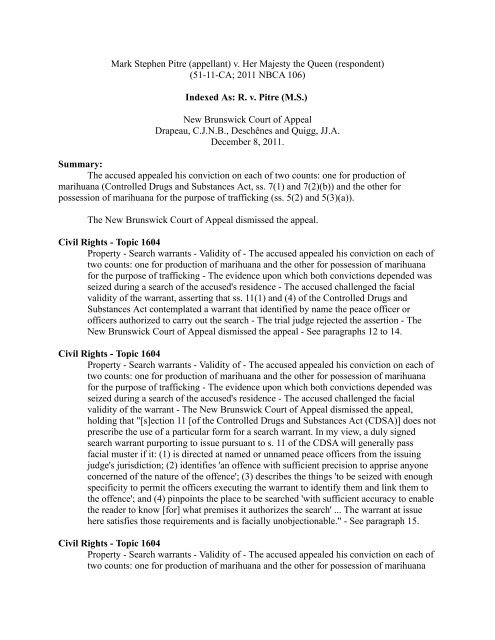
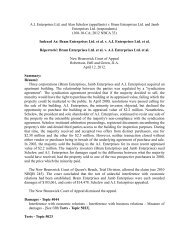
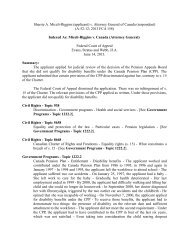
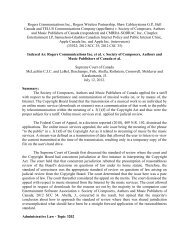
![Jones (appellant) v. Kaney (respondent) ([2011] UKSC 13 ... - Slaw](https://img.yumpu.com/46577625/1/190x245/jones-appellant-v-kaney-respondent-2011-uksc-13-slaw.jpg?quality=85)
